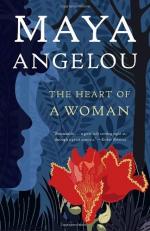|
This section contains 553 words (approx. 2 pages at 300 words per page) |

|
Set in the 1950s and '60s, Maya Angelou's autobiographical works are heavily influenced by the dynamics of the burgeoning Civil Rights movement. The political struggle becomes an undeniable presence in The Heart of a Woman, and Angelou's primary social concern is with the need for enacting social reform. The America described by Angelou is still a racist one. As a black woman angered by this persistent racism, Angelou infuses her autobiography with her thoughts on the nation's racial strife.
Oddly, much of the racism described by Angelou is observed from a distance. With the exception of a handful of interactions (most notably with a room full of administrators at her son's school), Angelou is not personally touched by the sickening hand of prejudice. Instead, The Heart of a Woman dwells on large, institutional racism. The most sustained protest against the white power brokers comes with...
|
This section contains 553 words (approx. 2 pages at 300 words per page) |

|




